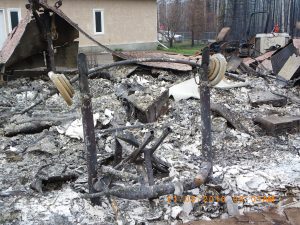Wildfire is a paradox we must learn to live with
0 October 8, 2020 at 12:49 pm by Glenn McGillivray Right from the get go, it is instilled in us that fire has very few redeeming qualities if any at all.
Right from the get go, it is instilled in us that fire has very few redeeming qualities if any at all.
Essentially nothing good ever comes from fire, or so we’re told.
It’s an evil force that must be quelled, no matter the cost.
The problem with this precept is that it’s not entirely true. And in the case of wildfire, there is little truth to it at all.
Now, it’s one thing for the general public to latch onto and propagate falsehoods about fire and forests. Quite another when those who control the messaging, policy and tactics subscribe to it as well.
But that’s what happened, and for the better part of 100 years or more, fire in the forest was viewed as a threat that had to be snuffed out at the earliest possible (in)convenience.
Some agencies even had it as their official mantra. In 1935, the U.S. Forest Service set out the 10 am policy whereby all wildfires were to be extinguished by 10 the morning after they were first detected.
This short-sighted policy of beating down wildland fire at all costs did at least two things.
First, it allowed decades of fuel to build up in wildlands across North America, leading to tinderboxes that, once lit and wind-whipped, were almost impossible to control. Couple this with the unmitigated sprawl of residences, industry and infrastructure into wildlands and the intensification of climate change and you enter into a new age of megafires – what noted fire historian Stephen Pyne has dubbed “The Pyrocene”.
Second, it has lead to a sort of “9-1-1 mentality”, where the fire service is called at the first detection of smoke and is expected to throw all resources at a wildfire until it is extinguished. Some point to the influx of urbanites into Wildland Urban Interface communities for the propagation of this attitude, an offshoot of the largely city-based “I pay my taxes, I want this fixed now” mindset.
There are two problems with this unrealistic “fix it” expectation. First, there is the false notion that all wildfires can be controlled and suppressed and that simply throwing more resources on a fire will speed that process. The truth is large and intense wildfires (those bigger than 200 hectares) are often virtually uncontrollable (the fire that razed a portion of Fort McMurray, AB in May 2016 smouldered for months after and wasn’t officially extinguished until August 2017). Second, there is the ugly truth that more and larger (climate change driven) fires will put great strain on available resources meaning that future fires will need to be triaged and some will have to be allowed to burn.
Lost somewhere in all of this is the fact that fire on the landscape is necessary.
In places like Canada, the forestry sector is valued deeply, contributing $25.8 billion to the country’s economy in 2018. But the funny thing – the paradox – is we wouldn’t have a forest sector without fire, because we wouldn’t have a boreal forest.
Yet, we often hear (usually from an uninformed media and others) about how fire “destroyed” a forest.
Take this past August, for instance, when news headlines and social media posts bellowed that fire had “devastated” California’s Big Basin Redwoods State Park. No mention was made that fire is of great benefit to Redwood trees (i.e. Giant sequoias) as it cleans the forest of competing undergrowth and opens Redwood cones, allowing them to release their seeds.
It is sometimes true, really large and intense wildfires can run so hot that they can destroy root structures and kill off stands of trees. This is of great concern as ecologists and foresters contemplate the many impacts that climate change will have on our forests in the decades ahead.
But more often than not, wildlands affected by fire bounce back very quickly and often in spades.
Now don’t get me wrong. We don’t need intense crown fires and we don’t need megafires. Nor do we need fires that endanger communities directly with flames or indirectly with smoke.
But just as we need water (but not flood water up to our hips), we need fire.
So we desperately need to peck away at the anti-fire discourse that has become a larger than life lie.
We must work to swap out the thinking that the problem of fire is one of suppression when the real problem is finding a way to coexist with it peacefully, so fire can be viewed as the ecological tool it is and not as some kind of scourge.
Note: By submitting your comments you acknowledge that insBlogs has the right to reproduce, broadcast and publicize those comments or any part thereof in any manner whatsoever. Please note that due to the volume of e-mails we receive, not all comments will be published and those that are published will not be edited. However, all will be carefully read, considered and appreciated.

Leave a Reply